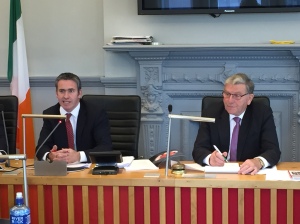(Check against delivery)
Tuesday, 27th September 2016
A Chathaoirligh, elected Members, esteemed colleagues: good afternoon everyone.
Thank you for affording me this opportunity to address you today.
Homelessness and the acute shortage of homes available to those who need them is one of the greatest challenges facing this country today. It is having a profound effect on the daily lives of many individuals and families who feel they have been failed by the system and who urgently require homes.
The Government and I have made it our number one priority to resolve the housing and homelessness crisis and under Rebuilding Ireland we have set out a broadly-based and comprehensive set of action to do just that.
Shortly after its publication, my colleague, Minister Coveney wrote to all elected members and all Chief Executives in relation to the implementation of the Rebuilding Ireland
As I see it, local authorities are absolutely central to that implementation, given your role as the main vehicle of governance and public service at local level.
One of the biggest challenges we face is getting house building, and supply more generally, moving again. Planning powers, in particular, at the disposal of local authorities can be employed to encourage and facilitate good quality housing, at affordable prices, in high demand areas.
It is imperative that local authorities do all within their power to get all suitable potential sources of housing supply to be activated as quickly as possible.
Both Minister Coveney and I will be visiting as many local authorities as we can over the weeks ahead to outline what we need and expect to see in terms of implementation and to hear from you the specific challenges that are faced locally in delivering on the Plan.
So where are we now? At the last summary of social housing assessments, the housing waiting list in -Kildare County stood at – 5,454(of course we’ll have updated figures when this year’s summary is published towards the end of the year);
In contrast to this the total number of new houses completed last year in the county was just 767 homes, nearly 30%of which were individual one-off houses
We are building considerably less new homes than we need and have done so for a number of years;
Almost 6% of housing stock in the county was reported as vacant in the 2016 Census and,
Meanwhile thousands of families and individuals are in mortgage arrears or facing increasing rents.
Failure to address the housing challenges we face, threatens our future growth and prosperity.
It’s time to do something serious about this, that’s my mandate from Government, as Minister of State with responsibility for Housing and Urban Renewal, and that’s what we’re here to talk about to-day.
Rebuilding Ireland: Action Plan for Housing & Homelessness
Rebuilding Ireland sets out a practical and readily implementable set of actions that will increase housing supply to create a functioning and sustainable housing system that is capable of:
- Providing homes for families in emergency accommodation;
- Tackling the underlying causes, addiction and otherwise, of people living on our streets;
- Producing a minimum of 25,000 housing units nation-wide every year by 2020;
- Performing post-2020 in response to contemporary housing needs
- Delivering more social housing, much faster, and putting in place financially sustainable mechanisms to meet current and future requirements for social housing supports.
Accelerating delivery to this level is essential if we are to –
- Address the unacceptable level of households, particularly families in emergency accommodation;
- Moderate the rental and purchase price inflation, particularly in urban areas;
- Address the growing affordability gap for many households wishing to purchase their own homes;
- Support the emergence of a rental sector which provides choice, mobility and quality accommodation in the right locations;
- Position the housing sector such that its contribution to the national economy is steady and supportive of sustainable economic growth; and,
- Ensure that measures intended to remedy the current supply difficulties also contribute to longstanding objectives in the housing sector, such as the need to support urban development and achieve sustainable communities.
Rebuilding Ireland balances delivery on these fronts with the necessary financial resources (€5.5bn investment by 2021) and structural reforms.
A key feature of the Plan will be highlighting ‘pathfinder’ projects, innovative and effective solutions to problems and approaches to projects that can be replicated in other local authority areas. I would encourage -Kildare to come forward with an exemplar in this regard.
We know that to deliver more quickly we need to look at the States procedures and processes be they planning, approval of social housing or otherwise and we’re doing that.
In terms of improving the viability of construction, it is important to recognise the reforms already in place. These include
- Reduced development contributions;
- the vacant site levy;
- Part V;
- apartment guidelines;
- financing under Activate Capital, and,
- Planning and Strategic Development Zones.
It is estimated that such measures taken to reduce input costs have decreased the cost of building new residential units by between €20,000 and €40,000, depending on whether apartments or houses are being constructed.
The Minister for Finance has indicated that fiscal measures to support the Rebuilding Ireland programme, and importantly measures for first-time buyers, will be included in the Budget in October.
We have responded in particular to the calls for funding to address infrastructure blockages, through the establishment of a €200m Local Infrastructure Housing Activation Fund to support enabling infrastructure to release lands for housing development. A call for proposals for suitable projects issued from my Department on 26th August and proposals are due back on 14th October. We anticipate that this fund has the potential to release the delivery of at least 15,000 to 20,000 new homes, which would otherwise not be delivered.
In terms of improving the functioning of the rental sector in the first instance we had to protect the most vulnerable and the increases in rent supplement and Housing Assistance Payment limits will do that.
In the longer term we need a really good and attractive rental option and the publication later this year of the comprehensive rental strategy currently being developed by the Department will chart a course to achieve a vibrant and attractive rental tenure option.
Rebuilding Ireland is a holistic Plan, an all-Ireland Plan, a plan that includes rural Ireland
Since taking up this Ministry, I have seen first-hand the negative effect the housing shortage is having on people and their families and how the whole system is struggling to cope and devise solutions.
Rebuilding Ireland is, I believe, a really good starting point to resolve these problems. Our commitment of €5.35 billion will go a long way to providing much needed social housing and the €200m infrastructure fund should encourage the production of thousands of homes for the market.
It’s a whole-of-Government initiative, and a national plan that needs to have an impact at all locations and all scales of development. Revitalising our rural towns and villages is as important as the plans for the main urban centres.
I lead the Urban Renewal Working Group, and I am committed to the re-building of our communities by addressing not just the physical environment but also by investing in social and economic development and in this context, we intend to introduce a new Town and Village Renewal Scheme.
Using the €30 million available to local authorities this year, the Scheme will seek to increase the attractiveness and sustainability of our towns and villages as places to live and work. My aim is use housing and community schemes in a collaborative way to improve city, town and village centres.
We will continue to work with colleagues in the Department of Arts, Heritage, Regional, Rural and Gaeltacht Affairs to co-ordinate their schemes with ours and to bring forward joint demonstration projects, where we can.
Conclusion
So that’s my take on what needs to be done to fix our broken housing model.
I really want to hear your views to make sure we have all the facts and that we are heading in the right direction under the Rebuilding Ireland
Returning to a normally functioning housing and construction sector is critically important in order to support economic growth, social progress and environmental sustainability. Our engagement here today forms an essential element of this broader policy context.
While the Government is acting, the challenge does not stop there. It is vital that as the 84 actions to facilitate house build are implemented that local authorities, approved housing bodies, builders and developers proactively respond to the housing supply challenge.
I know from talking to you and other Councils around the country that you are up for that challenge and will not be found wanting.
ENDS.















